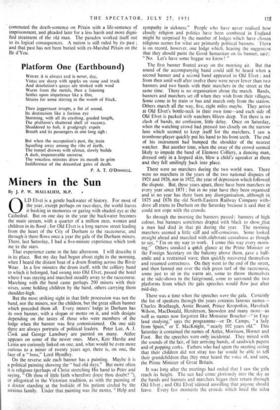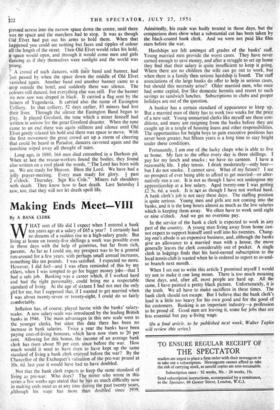Miners in the Sun
LI, 3. P. W. MALLALIEU, M.P. •
OLD Elvet is a gentle backwater of history. For most of the year, except perhaps on race-days, the world leaves it basking in memories or gazing with shaded eye at the Cathedral. But on one day in the year the backwater becomes the main stream, with a quarter of a million men, women and children in its flood ; for Old Elvet is a long narrow street leading from the heart of the City of Durham to the racecourse, and through it there flows once a year the gala of the Durham miners. There, last Saturday, I had a five-minute experience which took me to the stars.
That experience came in the late afternoon. I will describe it in its place. But my day had begun about eight in the morning, when I heard the distant beat of a drum floating across the River Wear. In a few minutes the'drum itself, with the colliery band to which it belonged, had swung into Old Elvet, passed the hotel where I was staying and marched steadily away to the racecourse. Marching with the band came perhaps 200 miners with their wives, some holding children by the hand, others carrying them shoulder-high. But the most striking sight in that little procession was not the band, nor the miners, nor the children, but the great silken banner which preceded them all. Every miners' lodge in Durham has its own banner, with a slogan or motto on it, and with designs depending on the tastes of those who were members of the lodge when the banner was first commissioned. On one side there are always portraits of political leaders. Peter Lee, A. J. .took and George Lansbury are painted on many. Attlee appears on some of the newer ones. Marx, Keir Hardie and Lenin are curiously linked on one, and, what would be even more curious to a miner of twenty years ago, there is, on one, the face of a "boss," Lord Hyndley.
On the reverse side each banner has a painting. Maybe it is a political painting showing the "bad old days." But more often it is religious (perhaps of Christ stretching His hand to Peter and saying, "Oh thou of little faith wherefore doest thou doubt? "), or allegorical in the Victorian tradition, as with the painting of a doctor standing at the bedside of his patient circled by the anxious family. Under that painting was the motto, "Help and sympathy in sickness." People who have never realised how closely religion and politics have been combined in England might be surprised by the number of lodges which have chosen religious scenes for what are primarily political banners. There is on record, however, one lodge which, hearing the suggestion' that they should paint the Good Samaritan on its banner, said: "No. Let's have some beggar we know! "
The first banner floated away on the morning air. But the sound of the accompanying band could still be heard when a second banner and a second band appeared in Old Elvet ; and from then until well after twelve there were never fewer than two banners and two bands with their marchers in the street at the same time. There is no organisation about the march. Bands, banners and marchers set off when they wish from their villagesJ Some come in by train or bus and march only from the station.! Others march all the way, five, eight miles maybe. They arrive at Old Elvet's bottle-neck in their own time—and each side ot Old Elvet is packed with watchers fifteen deep. Yet there is no' clash of bands, no confusion, little delay. Once on Saturday, when the watching crowd had pressed too closely on the narrow lane which seemed to keep Itself for the marchers. I saw a trombone-player quickly put his hand to his front teeth. The end of his instrument had bumped the shoulder of the nearest, watcher. But another time, when the sway of the crowd seemed likely to impede the band of Elemore Colliery, a dancing man, dressed only in a leopard skin, blew a child's squeaker at them and they fell smilingly, tack into place.
There were no marchers during the two world wars. There were no marchers in the years of the two national disputes of 1921 and 1926, nor in 1922, the year of depression which followed the dispute. But, these years apart, there have been marchers in' every year since 1871 ; but in no year have they been organised: and in no year has there been any disorganisation, although in 1875 and 1876 the old North-Eastern Railway Company with- drew all trains to Durham on the Saturday because it said that it could not cope with the crowds.
So through the morning the banners passed : banners of high' colour, but banners sometimes draped with black to show_that a man had died in that pit during the year. The morning marchers seemed a little stiff and self-conscious. Some looked straight ahead and marched with.elaborate casualness as though to say, "I'm on my way to work. I come this way every morn- ing." Others sneaked a qftick glance at the Prime Minister or the Foreign Secretary on the balcony above them, gave a half- smile and a restrained wave, then quickly recovered themselves and resumed correctness. On they went to the end of the street, and then fanned out over the rich green turf of the racecourse, some just to sit in the warm air, some to throw themselves at the side-shows in the fairground, some to surround the two platforms from which the gala speeches would flow just after mid-day.
There was a time when the speeches were the gala. Certainly the list of speakers through-the years contains famous names— Charles Bradlaugh, Annie Besant, Prince Kropotkin, Havelock Wilson, MacDonald, Henderson, Snowden and many more—as well as names now forgotten like Monsieur Boucher—" in Eng- land studying," says the programme—or Dr. Camps, "a lady from Spain," or T. MacKnight, "nearly 102 years old." This Saturday it contained the names of Attlee, Morrison, Homer and Foot. But the speeches were .only incidental.. They mixed with the sounds of the fair, of late arriving bands, of sandwich papers and of popping corks. Fathers who had spent the meeting seeing that their children did not stray too far would be able to tell their grandchildren that they once heard the voice of, and seen, the Prime Minister of Great Britain.
It was long after the meetings had ended that I saw the gala reach its height. The sun had come, gloriously into the sky as the bands and banners and marchers began their return through Old Elvet ; and Old Elvet se.emed unwilling that anyone should leave. Every few moments the crowds which lined the sides pressed across into the narrow space down the centre, until there was no space and the marchers had to stop. It was as though Old Elvet had put out his arms to hold them. When that happened you could see nothing but faces and ripples of colour all the length Of the street. Then Old Elvet would relax his hold, a space would open, and through it would come men and girls dancing as if they themselves were sunlight and the world was young.
A crowd of such dancers, with their band and banner, had just passed by when the space down the middle of Old Elvet vanished again. Another band and another banner came to a stop outside the hotel, and suddenly there was silence. The colours still danced, but everything else was still. For the banner We now saw was draped in black. It carried a flag sent by the miners of Yugoslavia. It carried also the name of Easington Colliery. In that colliery, 52 days earlier, 83 miners had lost their lives. Through the silence the Easington Band began to ialay. It played Gresford, the tune which a miner himself had written in sorrow for the great Gresford disaster. When the tune came to an end there was again stillness and silence until Old Elvet gently relaxed his hold and there was space to move. With the first movement the great crowd set up a storm of cheering that could be heard in Paradise, dancers cavorted again and the sunshine wiped away all thought of tears.
Long ago, in 1880, 164 men died entombed in a Durham pit. When at last the rescue-workers found the bodies, they found also written on a roof plank the words, "The Lord has been with us. We are ready for Heaven. Bless the Lord. We have had a jolly prayer-meeting. Every man ready for glory. past 2 o'clock. Thursday. Sign Ric Cole." Miners rub shoulders with death. They know how to face death. Last Saturday I saw, too, that they will not let death spoil life.



































 Previous page
Previous page